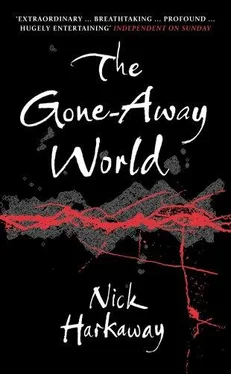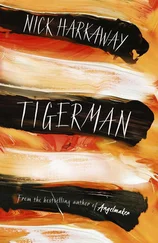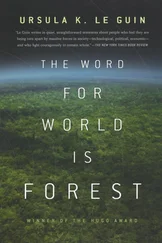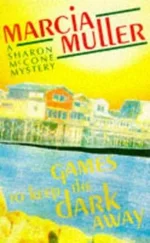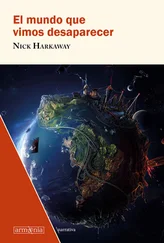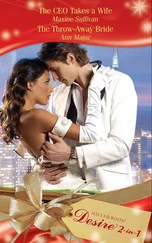Nick Harkaway - The Gone-Away World
Здесь есть возможность читать онлайн «Nick Harkaway - The Gone-Away World» весь текст электронной книги совершенно бесплатно (целиком полную версию без сокращений). В некоторых случаях можно слушать аудио, скачать через торрент в формате fb2 и присутствует краткое содержание. Жанр: Фантастика и фэнтези, Фэнтези, на английском языке. Описание произведения, (предисловие) а так же отзывы посетителей доступны на портале библиотеки ЛибКат.
- Название:The Gone-Away World
- Автор:
- Жанр:
- Год:неизвестен
- ISBN:нет данных
- Рейтинг книги:4 / 5. Голосов: 1
-
Избранное:Добавить в избранное
- Отзывы:
-
Ваша оценка:
- 80
- 1
- 2
- 3
- 4
- 5
The Gone-Away World: краткое содержание, описание и аннотация
Предлагаем к чтению аннотацию, описание, краткое содержание или предисловие (зависит от того, что написал сам автор книги «The Gone-Away World»). Если вы не нашли необходимую информацию о книге — напишите в комментариях, мы постараемся отыскать её.
The Gone-Away World — читать онлайн бесплатно полную книгу (весь текст) целиком
Ниже представлен текст книги, разбитый по страницам. Система сохранения места последней прочитанной страницы, позволяет с удобством читать онлайн бесплатно книгу «The Gone-Away World», без необходимости каждый раз заново искать на чём Вы остановились. Поставьте закладку, и сможете в любой момент перейти на страницу, на которой закончили чтение.
Интервал:
Закладка:
“Yes,” Mary Sensei says, “there’s one more thing we can try.”
Which is how, for the first time without Gonzo Lubitsch, I come to be standing on the doorstep of Wu Shenyang, seeking admittance to the House of the Voiceless Dragon.
“Wu like woo, ” Mary Sensei said two minutes ago, strangely breathless in her aged VW Rabbit as we sat waiting for the precise appointed hour, “and then Shen and Yang as if they were separate, but they’re not. And you don’t call him Wu Shenyang, anyway, you call him Mister Wu. Or Master Wu. Or . . .” But she could not think of anything else I might call him and anyway it’s time. The door opens. An excited voice says “Come, come!” and I watch my feet take me across the threshold.
Mister (Master) Wu is the first teacher of whatever sort to ask me to his home, and he is the first martial arts instructor who has wanted to know me off the mat before seeing me perform on it. According to Mary Sensei, if he does not find what he is looking for in my heart, there will be no point in testing the rest of me. I inspect my heart, and it seems an impoverished organ for such a big task. It is the right sort of size and located not as moviegoers believe in the high left side of the chest (that is in fact a lung) but just off centre and further down. It beats approximately seventy times a minute and pumps vital nutrients and oxygen carried by haemoglobin around my body in the approved fashion, but it conceals as far as I can tell no mysteries, and is devoid of secret heritage or supernatural skills. Having thus ascertained by introspection that I lack whatever it is this gentleman is seeking, I feel able to observe his living room, which is itself remarkable. It is, as well as being a place to sit and read and eat cake, a treasure house of oddments and curiosities—a gold statue of a warlike pig in one corner, a pair of Foo Dogs on the mantle, standing lamps from various periods of design, weapons and china ducks on all the walls. Wu Shenyang is still assessing me—I can feel the stress of his regard—and so I begin to catalogue the contents of this place with an eye to returning perhaps as a cleaner or a general dogsbody.
Item: two armchairs, split in various places and of considerable antiquity, but also to all appearances monstrously comfortable. These are positioned loosely on either side of an open fire at one end of the room, along with a coffee table whose clever construction allows books to be stashed willy-nilly beneath the tabletop.
Item: with its back to us, a leather sofa of similarly advanced age, showing signs (to wit, a pillow and a blanket) of having recently been used as a camp bed. Indeed, there appears to be a person camping on it still, because a pair of white-socked feet, slender and almost certainly feminine (by the pattern of the weave) and perhaps my own age or a little younger, protrude from the western side.
Item: a grandfather clock, running smoothly if somewhat previous, in dark and gold-leafed wood with a fine, painted face. The panel door is open and the pendulum is visible as it makes its long, slow strokes from left to right and back again, producing a steady and undeniable tock tick noise in defiance of convention. This tock tick also reassures me that the person on the sofa is alive and not dead, because her northernmost foot tock ticks along with it from time to time, and then returns to a state of rest.
Item: one desk and chair, both liberally covered in cake crumbs and paper. The desk is functional rather than impressive, and surmounting the piles and stacks of letters and drawings is a single sheet of blank paper and a pencil. Mister (Master) Wu does not use a pen for casual work, because where—or maybe when —he comes from, ink is expensive. Thus, the softest of soft leads, because Mister (Master) Wu is writing in Chinese.
Item: an ancient gramophone, literally; not a stereo or a turntable, not a CD player, but a scratched and whistling construction with a chrome arm and a huge flower-shaped horn and a thick, blunt needle making music from brittle black discs which turn at 78 rpm. The entire trick is accomplished mechanically, without electricity or transistors or silicon.
To me, a child of the digital age, this is a great white magic, so awe-inspiring that I forget for a moment to be nervous of Wu Shenyang. It is in any case hard to remember that he is a person of dread solemnity and pomp, because he seems to approach everything as a kind of game. He is even now leaping over to the gramophone to display it in full glory: winding it, picking out an old record by the Fisk University Jubilee Singers and grinning widely as he waits for my reaction to his fabulous trick. I am too lost in the crackling perfection to smile, until the record comes to an end and his deft fingers lift the needle away. He drags out from beneath the machine a bag of yet more impossible records and presses them upon me. I leaf through them with aching concern that I will shatter one, and finally play the adagio from Mozart’s Clarinet Concerto in A, listening until the very end. Mister (Master) Wu’s gaze lights on my fingers as I lift the needle just as he did, because this thing is too perfect, too carefully preserved and lovingly made, to allow it to be injured by carelessness. And then finally I am looking at the man before me.
Wu Shenyang is tall and thin. He does not look like Buddha, he looks like a ladder in a dressing gown. Time has polished him, abraded him and passed on, leaving him nearly eighty and stronger than a brace of college athletes, though he favours his right leg just a little. His wide, umber-coloured face is not impassive like that of Takagi Sensei, who once visited Mary’s dojo and grunted meaningfully as I launched weak and indicated attacks at a girl from Hosely; despite the bristling brows in shock-silver above his eyes, he is not stern. Wu Shenyang laughs loudly—alarmingly—at inappropriate moments, and seems to take joy in inconsequential things, like the colour of the window putty and the slipperiness of the carpet in front of his desk. The latter he demonstrates to me by standing square in the slick patch and gyrating wildly, waggling his whole body, sliding his slippers on the spot as he shifts his weight rapidly from one to the other and twisting his hips. When he has finished, nothing will do but that I take a turn. I am immediately concerned that he will think I am mocking his game leg, but again I copy his method exactly and he registers his approval by laughing and shouting “Elvis Presley! Graceland!” When he tries to say “rock and roll” he gets into a terrible tangle because his English is, even after many years speaking it, gently accented with his mother tongue—but this also doesn’t worry him in the slightest, and so it doesn’t worry me either. We pass on to further matters of consequence: he likes my trousers, but he thinks my watch is too young for me, because it features a smiling cat whose whiskers indicate the hour and minute. He also thinks I need a new barber, and though loyalty prompts me to defend Ma Lubitsch’s kitchen table cut, I do so in the knowledge that he is right. Wu Shenyang apologises—to me and to Ma Lubitsch. There is a snort from behind the sofa, but I am immune. An elder stranger, without irony, treats me as a being of equal worth—if of lesser experience and discernment in the matter of timepieces. In the course of the watch discussion we compare forearms, and it is established that mine is actually as thin as his, which for some reason is hugely pleasing to him. Only when I explain why I am here—though of course he must know—does he recover his composure. He peers at me gravely and ponders, and I prepare myself for the inevitable, the impossible testing and the sorrowful rejection. He turns to the wall and selects from amid the ducks a short fat sword with a single edge and a sharp point. Holding it carefully in one hand, he removes the sheath and turns to me.
Читать дальшеИнтервал:
Закладка:
Похожие книги на «The Gone-Away World»
Представляем Вашему вниманию похожие книги на «The Gone-Away World» списком для выбора. Мы отобрали схожую по названию и смыслу литературу в надежде предоставить читателям больше вариантов отыскать новые, интересные, ещё непрочитанные произведения.
Обсуждение, отзывы о книге «The Gone-Away World» и просто собственные мнения читателей. Оставьте ваши комментарии, напишите, что Вы думаете о произведении, его смысле или главных героях. Укажите что конкретно понравилось, а что нет, и почему Вы так считаете.
